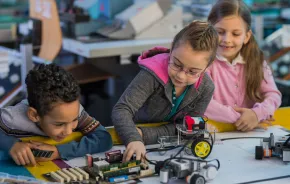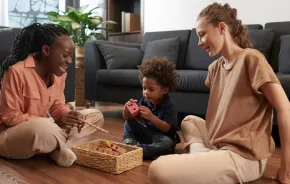
The process of choosing a preschool can stir up plenty of anxiety for parents, because this is often the first decision they make about their child’s education. It’s easy to put a lot of pressure on ourselves, and to feel like we have to get this right and not make any mistakes. It’s common for worried parents to ask themselves: “How do I know if this school is right for my child?” “What if we don’t get into the right preschool?” “Will the choices I make now affect elementary school, high school and college choices later on?”
What’s important to keep in mind is that preschool is a wonderfully positive opportunity for your child to experience time with peers, learn how to separate from a caregiver, and build their social and emotional skills. Ultimately, the “right” decision is about choosing a preschool that works for your family, addresses your child’s individual needs and reflects the type of early education community that you want to be a part of. Last time I looked, there were about 1,000 preschools in the greater Seattle area, so there are plenty of options, and you will find the right place for your child.
When supporting your child’s early education and development, it’s especially important for parents to keep in mind that learning happens best through play with young children.
Window shopping: Understanding different preschool learning philosophies
There’s a variety of different early learning philosophies that we hear about from schools and other parents, and I think it’s helpful for parents to have a general idea of what the key differences are.
Montessori programs focus on individual learning. These programs take a very self-paced and self-directed approach, with not a lot of group work. Teachers act as guides to help children progress to other activities that might be right for them.
Reggio Emilia programs have four main principles. One of these principles is collaboration, with children working in both small and large groups. Another is project-based learning, giving kids the opportunity to study one subject in depth. Representational learning is also emphasized, presenting a subject through various forms, so that kids with diverse learning styles and needs are able to engage with the material. Reggio Emilia teachers also follow an emergent curriculum, meaning they create and adapt the curriculum to what the children are interested in at the time
Waldorf schools prioritize a focus on the natural world, favoring lots of time outdoors for students; also, classrooms tend not to include technology, plastics or synthetic items. The Waldorf philosophy is about engaging and opening the child’s mind, spirit and soul to a love of learning within the natural environment. Activities tend to be group-based.
Cooperative preschools rely on a lot of parent involvement in the running of the classroom. Such schools are often run by the parents themselves and include a board, with the board being responsible for hiring teachers.
Occasionally, you’ll hear about academics-based preschools: These are teacher-driven classroom settings that emphasize rigorous preparation for elementary school, and there is not as much emphasis on what the children are motivated by or interested in learning and exploring. I can’t recommend this model, as it moves kids away from the way they learn best: by playing. Play is the work of children, and it allows them to focus on developmentally appropriate tasks, which act as building blocks to naturally move the child forward to their next stages and discoveries.
How do I find the right fit?
When thinking about the right preschool for your child, start with your child. Think about who your child is and what activities they enjoy. Is she a social butterfly who likes to play with her peers, or does she prefer individual activities? Does he like a calm, quiet classroom environment, or would a more active, engaged classroom better match his personality? Focus on your child’s unique attributes and preferences for activities — and make sure that those qualities and options are supported by and reflected in the school.
Next, think about yourself and your family. Although you’re choosing education for your child, it’s important to think about what kind of community you, as a parent, want to be involved in. If the preschool offers a community you feel as though you could connect with, you are more likely to be actively involved in your child’s preschool experience. Thinking about your own child and your own values helps you tune in to a preschool that will be the right fit for everyone involved.
Play is the thing
When supporting your child’s early education and development, it’s really important for parents to keep in mind that learning happens best through play with other young children. During play, kids learn how to share, solve problems, delay gratification, regulate their emotions and practice flexibility. In addition, play gives children ample time and occasion to develop empathy. This is a life skill that is critical for solving problems and dealing with conflict. More and more findings from research confirm that social and emotional skills are the critical building blocks for future academic success, which means we need to prioritize play in order for our children to be ready to learn when they enter elementary school.
Sometimes our drive to ensure that our children are prepared for success later in life can create unrealistic expectations for what we want them to know coming out of preschool. For example, having an expectation that our kids should be able to read and write in preschool would not be a developmentally appropriate objective or outcome, because focusing on those skills might come at the expense of tasks and experiences that would be more developmentally appropriate and essential for that age. Of course, if your child is interested in reading and writing, a teacher supporting and providing opportunities for your child to further develop those skills is great.
Realistic expectations about what your child will learn from preschool include having ample time to practice skills without fear of making mistakes; developing social and emotional skills through learning how to interact with their peers; developing confidence in their abilities; and discovering that school and learning are fun.
How do I make this decision?
The first step in the preschool decision-making process is to identify your priorities. This includes taking child-care needs into account — do you need part-time or full-time child care? Carefully consider the location of the preschool. There might be a terrific preschool across town, but are you willing to drive there on non-school days to support your children’s developing friendships?
Consider what curricular activities you would like your child to experience. Is a second language important? Is music or the arts important? Consider what kind of community you want to be a part of: Do you want a setting in which you need to be involved, or do you want a preschool where you can simply drop off your child? Is it important that the program or school philosophy is affiliated with a cultural or religious practice?
After identifying your priorities, you need to do your research. This involves talking to other parents, attending preschool fairs and evaluating available programs online.
After doing your research, it is imperative to visit schools and ask a lot of questions. Submit your top choices to the kid test: Bring your child with you and notice how the teachers and staff interact with them. Also pay attention to the environment. Is it bright and well lit? Is it clean? Are there any safety red flags that you notice? When you have a chance to ask questions of teachers and administrators, it’s important to inquire about their discipline philosophy and strategies. How do they handle situations when kids get into mischief? Asking about staff retention may give you a clue as to how happy employees are in their jobs.
Keep reflecting on the values you identified as priorities for a preschool fit for your kid and evaluate whether those seem to be a part of the curriculum and environment.
Lastly, trust your instincts. You know your child best, and you will be able to find the right fit for them. And if, for some reason, it doesn’t feel like the right fit after your child has started, know that children are incredibly resilient, and if you need to switch schools, you’ll be able to do so.
My biggest piece of advice is to try not to let the preschool hype overwhelm you: Pay attention to the specific factors that are important to you. When you shift your focus to the bigger picture, the decision becomes less about the “perfect” preschool and more about the best fit for your child and family.











